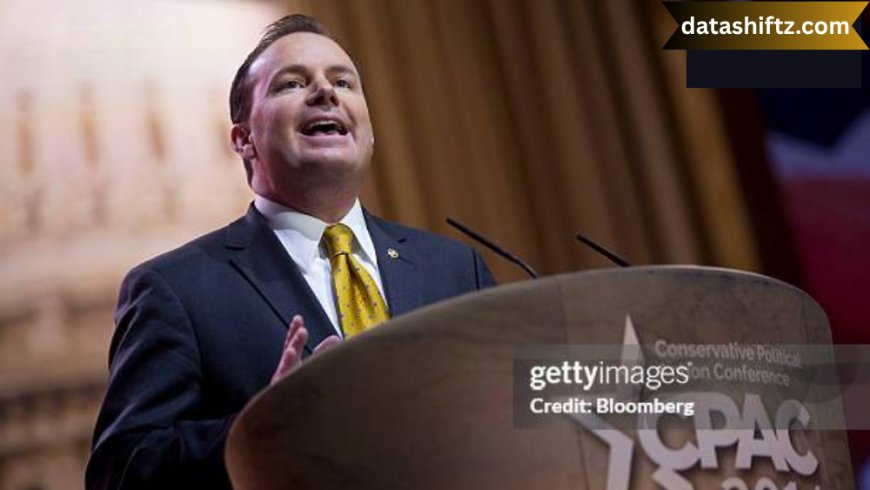Mike Lee: The Conservative Voice of Utah and His Impact on American Politics

Introduction
Mike Lee is one of the most recognizable figures in contemporary American conservatism. As the senior U.S. Senator from Utah, he has built a reputation as a principled constitutionalist, an advocate for limited government, and a fierce defender of individual liberties. His political journey reflects not only his deep ideological commitments but also the broader dynamics of modern American politics—where polarization, constitutional debates, and party identity frequently dominate headlines.
This article explores Mike Lee's life, career, and influence in a comprehensive way. From his early legal background to his tenure in the Senate, we will examine his key legislative initiatives, political ideology, and the controversies and achievements that have defined his time in public service. We will also present data in table form for easy reference and provide list form insights for quick understanding of his political career and views.
Early Life and Legal Career
A Foundation in Law and Constitutionality
Michael Shumway Lee, born on June 4, 1971, in Mesa, Arizona, was raised in a household steeped in conservative values and constitutional law. His father, Rex E. Lee, served as the U.S. Solicitor General under President Ronald Reagan and was the founding dean of the J. Reuben Clark Law School at Brigham Young University (BYU).
Mike Lee followed in his father’s footsteps by studying at BYU and then earning his Juris Doctor (J.D.) from BYU’s Law School. His deep understanding of the Constitution was evident from the beginning, and he began his legal career by clerking for then-Judge Samuel Alito on the U.S. Court of Appeals. He would later clerk for Alito again on the U.S. Supreme Court.
Career Highlights Before the Senate
-
Assistant U.S. Attorney in Utah
-
General Counsel to Utah Governor Jon Huntsman
-
Built a reputation as a constitutional expert and conservative legal thinker.
Rise to Political Prominence
Senate Campaign and Election
In 2010, amidst the surge of the Tea Party Movement, Mike Lee ran for the U.S. Senate with a platform focused on limited government, fiscal restraint, and strict constitutional adherence. He won the Republican primary against longtime incumbent Bob Bennett, marking a shift toward more ideologically driven conservatism within the GOP.
He went on to win the general election and was sworn into office in January 2011.
Senate Tenure: Key Positions and Legislative Work
Mike Lee's Political Profile and Senate Activities
| Attribute | Details |
|---|---|
| Full Name | Michael Shumway Lee |
| Date of Birth | June 4, 1971 |
| State Represented | Utah |
| Senate Term Start | January 3, 2011 |
| Party Affiliation | Republican |
| Education | B.A. in Political Science, J.D. from BYU Law School |
| Committees | Judiciary, Energy and Natural Resources, Commerce |
| Political Ideology | Conservative, Libertarian-Leaning |
| Reelection | 2016 (Reelected), 2022 (Reelected) |
Legislative Priorities and Policy Positions
Mike Lee has focused his legislative efforts on constitutional fidelity and curbing federal overreach. Below are some of the key policy areas and his stances:
1. Constitutional Reform
-
Strong advocate for originalist interpretations of the Constitution.
-
Opposes executive overreach and has criticized both Republican and Democratic presidents on the use of executive orders.
2. Fiscal Policy
-
Opposes unnecessary government spending.
-
Proposed multiple balanced budget amendments.
-
Frequently votes against spending bills unless they strictly align with conservative fiscal principles.
3. Civil Liberties and Surveillance
-
Critic of mass government surveillance programs.
-
Co-sponsored the USA FREEDOM Act, aiming to reform the Patriot Act and limit NSA data collection.
4. Immigration
-
Supports border security and legal immigration reform.
-
Opposes pathways to citizenship for undocumented immigrants but supports expanding merit-based immigration.
5. Technology and Antitrust
-
Vocal critic of Big Tech monopolies.
-
Supports stronger antitrust enforcement while maintaining a market-friendly stance.
Notable Achievements and Controversies
Achievements
-
Instrumental in pushing forward judicial appointments during the Trump administration.
-
Helped shape key debates around constitutional law and the balance of power in government.
-
Respected across ideological lines for consistency and intellectual rigor.
Controversies
-
Criticized for downplaying the seriousness of the January 6 Capitol Riots.
-
Accused of being too closely aligned with Donald Trump, particularly during attempts to contest 2020 election results.
-
Viewed by some as obstructionist due to frequent votes against bipartisan spending bills.
Key Facts About Mike Lee
-
Clerked for U.S. Supreme Court Justice Samuel Alito.
-
Won Senate seat amid the Tea Party wave in 2010.
-
Consistently scores high on conservative rating indexes, such as the Heritage Action Scorecard.
-
Published author – Wrote books including “Our Lost Constitution” and “Written Out of History”.
-
Has opposed both Democratic and Republican leaders on constitutional grounds, showing independence.
Public Perception and Influence
Mike Lee's influence extends beyond Utah. Nationally, he is often regarded as a constitutional purist, and he enjoys a strong following among libertarian and conservative circles. His legal scholarship and consistency in voting patterns have earned him respect, even from critics.
However, his refusal to compromise on certain issues has sometimes led to political isolation within his own party. Despite that, he remains a key voice in shaping the ideological direction of the Republican Party, particularly among younger conservatives and libertarian-leaning voters.
The Future of Mike Lee in American Politics
As of 2025, Mike Lee continues to serve in the Senate and remains a powerful conservative figure. While he has not publicly expressed interest in running for president, he could be a strong contender for roles in future Republican administrations, particularly in the areas of justice, law, or constitutional reform.
Given the growing ideological divide in the U.S., leaders like Lee who maintain a firm ideological stance are likely to continue wielding significant influence. Whether he remains in the Senate or takes on a different role, Mike Lee will undoubtedly play a part in shaping America's conservative landscape for years to come.
Conclusion
Mike Lee’s career is a reflection of the ideological fervor that has reshaped American conservatism in the 21st century. With a background in constitutional law and a deep-rooted belief in limited government, he has become a defining voice for a generation of conservatives seeking a return to foundational principles.
Whether you admire his steadfastness or question his rigidity, Mike Lee is undeniably one of the most intellectually consistent and influential senators in the U.S. Senate. His impact on legislative debates, judicial confirmations, and the broader constitutional discourse ensures that his legacy in American politics will endure.






























